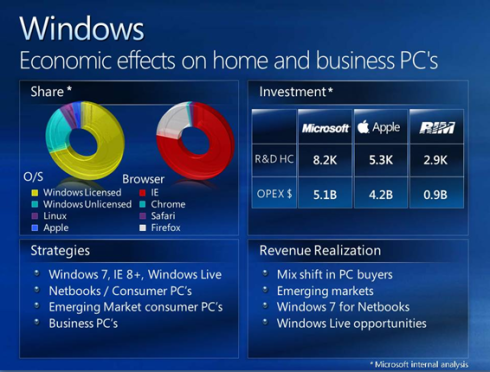Desktop GNU/Linux Does Not Need 'Saving'
- Dr. Roy Schestowitz
- 2010-06-08 01:22:46 UTC
- Modified: 2010-06-08 01:22:46 UTC

Steve Ballmer's presentation slide
from 2009 shows GNU/Linux as bigger than Apple on the desktop
Summary: Response to fear mongering from IDG, which uses a tricky line of reasoning to suggest that "desktop Linux has floundered" (which it hasn't)
SHOWN above is a chart from last year (source: Microsoft) just to remind people why Microsoft considers GNU/Linux to be a top desktop ("client") competitor. On the desktop too GNU/Linux is thriving, especially in emerging markets where the cost of Windows settled around $0. Eric Knorr from IDG wrote a provocative piece preceded by some headline with the obligatory question mark. He appeals to emotion when he asks: "Can desktop virtualization save desktop Linux?" (which insinuates that "desktop Linux" needs saving or is dying)
Desktop Linux has floundered for three main reasons: too few applications, limited desktop hardware compatibility, and too few tools (not to mention skilled people) to manage a boatload of Linux desktop systems.
Wait a second. First of all, it has not floundered (it grows rapidly in tablets and sub-notebooks, even smart phones. Apple and Google have both acknowledged that these are the growth areas and Microsoft is nervous about this evident computing shift). Second of all, GNU/Linux has a compatibility layer which enables it to run more applications than Windows. Thirdly, hardware support is better in Linux than in Windows and lastly it ought to be added that people rarely struggle to cope with their GNU/Linux desktops when they use a modern desktop environment. It's really user friendly, as many new users would happily attest to. One could go on and refute the other parts of this inaccurate article from Knorr, but what's the point? It's like feeding the provocateur.
⬆

